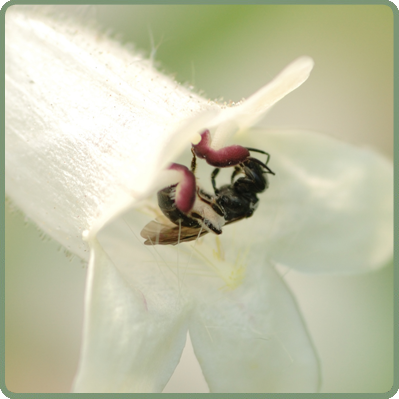![]()
 We all work hard in our gardens, but perhaps no creature more than the Mason Bee.
We all work hard in our gardens, but perhaps no creature more than the Mason Bee.
They are named from their habit of making compartments of mud in their nests, which are made in hollow reeds or holes in wood made by wood boring insects. Unlike honey bees or bumblebees, Mason Bees are solitary; every female is fertile and makes her own nest, and there are no worker bees for this species. They produce neither honey nor beeswax.
What they do provide, for us and our gardens, is pollinization. As they fly from plant to plant, gathering provisions which will feed their offspring, they enable the fertilization and reproduction of the garden. A garden full of Mason Bees is a healthy garden, indeed!
Some facts about the Mason Bee that will help you attract and keep them in your yard:
- The Mason bee does not fly far for its food source, only about 200 feet, and will leave its nesting site for a better source. So the key to having the bees pollinate your orchard, and not your neighbors, is to keep plenty of nesting blocks, and to provide a pollen source for them.
- Mason Bees stay nearby and remain healthier if they have enough pollen source for their entire short life span. Make sure there is a diversity of pollen sources both before and after the blossoming of your main crops (fruit trees) that you want them to pollinate.
- Mason bees aren’t as attracted to red flowering annuals and perennials, they prefer yellow, purple or blue shades.
- Mason bees are generally active March thru June. So the early spring blooming plants are their pollen source
Attract more Mason Bees, or help keep your bees close, by adding these plants to your yard:
Pieris
Cherry
Pear
Apples
Quince – flowering
Laburnum spp
Blueberries
Winter blooming heathers
Oregon Grape
Blackberries
Dogwoods
Red Maples – Acer rubrum
Raspberries
Serviceberries
Sumac
Willow
Primroses
Roses – especially the Rugosa type
Vinca
Currant
Crabapples
Peonies
Cranesbill Gernaiums (hardy Geraniums)